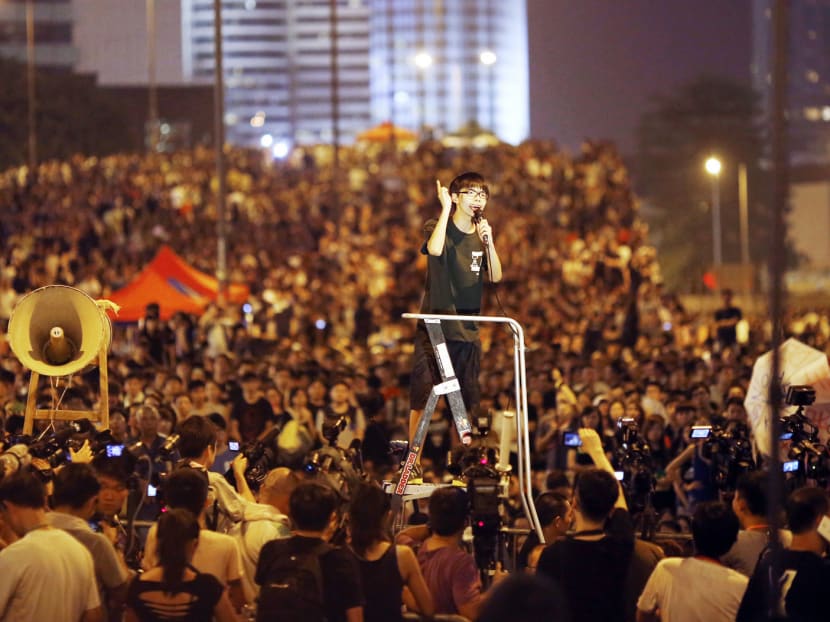HK protest leader sets up history duel with Beijing
HONG KONG — In 2014, Mr Joshua Wong led one of the biggest street protests against the Chinese government since Tiananmen Square in 1989.

Mr Joshua Wong, leader of the student movement, delivering a speech outside the government headquarters building in Hong Kong in 2014. Support for self-determination and even independence from China has grown rapidly since 2014’s mass occupation of central Hong Kong — also known as the Umbrella Revolution.
Photo: Reuters
HONG KONG — In 2014, Mr Joshua Wong led one of the biggest street protests against the Chinese government since Tiananmen Square in 1989.
Now the Hong Kong student activist is taking the fight with Beijing to a new battlefield: The historical archives.
Mr Wong and a phalanx of young scholars have launched a crowdfunding drive to support research that promotes their vision of self-determination for the semi-autonomous Chinese territory. They have already raised US$13,000 (S$18,444) of their targeted US$64,000 to fund archival digging in the United Kingdom, United States and beyond.
“I don’t think the history of Hong Kong has been fairly written,” said the 20-year-old politics student and democracy campaigner. “Rather than leave it to Beijing or the British government, it’s time for Hong Kong people to evaluate and interpret our own story. If we can’t interpret our history, how can we fight for the future?”
Support for self-determination and even independence from China has grown rapidly after 2014’s mass occupation of central Hong Kong — also known as the Umbrella Revolution — failed to win democratic concessions from Beijing.
In September about 20 per cent of Hong Kongers voted for candidates promoting self-determination or independence in the Legislative Council election, up from just a handful of people before the Umbrella Revolution.
The movement has been catalysed by increasing interventions in Hong Kong affairs by the Chinese government, from abductions of booksellers and a billionaire to political meddling.
Democracy advocates say these are gross violations of the “high degree of autonomy” promised to the former British colony for 50 years when it was handed to Beijing in 1997.
But China’s Communist government, which views democracy campaigners and separatists as a serious threat to its legitimacy, accuses Mr Wong and his ilk of trying to “stir up trouble” and take Hong Kong “on to a dangerous path”.
In November, it banned supporters of Hong Kong independence from sitting on the territory’s 70-member Legislative Council, and two lawmakers have already been booted out of the council at the behest of Beijing after claiming that “Hong Kong is not China”.
Mr Nathan Law, a member of Mr Wong’s Demosisto party and Hong Kong’s youngest legislator at just 23, is one of four other lawmakers supporting self-determination who the Hong Kong government is trying to oust in a court challenge.
Mr Wong argues that the territory’s seven million people were deprived of the right to determine their own future when Hong Kong was removed from a United Nations list of colonies in 1972 at the request of China, which had joined the UN a year earlier.
Hongkongers were then denied a say in the handover negotiations between London and Beijing. Mr Wong said his colleagues plan to highlight what they see as the unfair nature of these decisions through their research.
His fundraising drive, which began this month, has been backed by seasoned academics including Jerome Cohen, a professor of Chinese law at New York University, and Mr Larry Diamond, a professor of political science at Stanford University. Ms Vaudine England, a research associate at the University of Bristol’s Hong Kong History Project, also welcomed the efforts of the young scholars. “There are still huge parts of Hong Kong history that remain undiscovered,” she said.
Mr John Carroll, a historian at the University of Hong Kong, was more sceptical, arguing that these young researchers were driven by ideological motivations. He added that the idea that Hong Kong’s historiography was controlled by Britain and the Chinese government is “old hat”. “I’ve been arguing for 20 years that Hong Kong has had its own identity,” he said.
Mr Jeffrey Ngo, a postgraduate student from Hong Kong at New York University and one of the lead architects of the new history project, rejected the claim that he and Mr Wong were merely trying to promote their own ideology.
“The main purpose of crowdfunding is to support trips to archives so we can scan and digitise documents for public view online,” he said over the phone from London, where he is conducting thesis research at the UK’s National Archives. But Mr Ngo, who together with Mr Wong has traded rhetorical blows with the Chinese government in a series of competing newspaper editorials, added that the very process of writing their own draft of history was part of building a Hong Kong identity distinct from China.
In a reference to Imagined Communities, a seminal work on the origins of nationalism by the late Asia historian Benedict Anderson, Mr Ngo said: “By attempting to raise historical consciousness among Hong Kongers, we’re trying to create our own imagined community.” FINANCIAL TIMES





